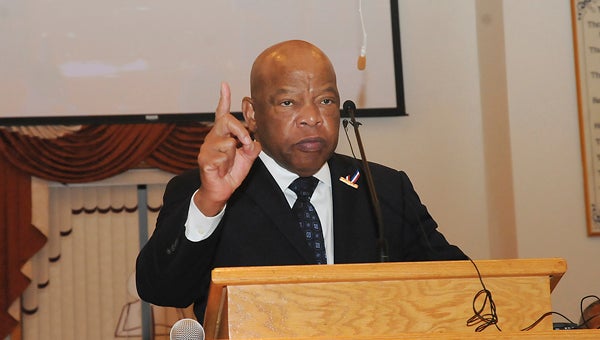Documentary discusses life of Ernest L. Doyle
Published 10:41 pm Thursday, February 15, 2018
By Adam Dodson | The Selma Times-Journal
Clinton Chapel AME Zion Church, located at 615 Green Street, will be the host of a film preview and discussion centered around the upcoming documentary about a Selma voting rights activist, Ernest L. Doyle, a member of the “Courageous Eight.”
The film, titled “Doyle,” documents his life in the Selma civil rights movement throughout the mid-1900s. Producer William Waheed of Cosmo-D Productions will be present to answer questions about the film, along with Clinton Chapel pastor and president of NAACP Lawrence Wofford.
With Doyle being a major player in the civil rights movement, Waheed felt the impact of his actions from the telling of his life from his family, friends and peers. Waheed began research for his film around six months ago. Doyle passed away in 2011.
“There is a message for all of us in this film to bring about a more just and fair system,” Waheed said. “He never got recognition for his work in the civil rights movement. It speaks for his selfless nature. He was not trying to make a name for himself. He was an invisible giant.”
Waheed and Wofford both refer to Doyle as an invisible giant because of how his significant works for racial advancement have been overlooked through the years due to lost documentation, forgotten history, intimidation tactics and complications.
Doyle had a rich and impactful life in Selma, with both men saying he was the first African-American councilman in the city’s history. Doyle also served as NAACP president for 15 years from 1965 to 1980, a time period where Wofford says the NAACP experienced “unprecedented changes” for the better. They also say in 1955, he was the first one jailed for petitioning the desegregation of schools.
Despite this, it is nearly impossible to find any local Selma records of him, according to Waheed.
While many of his archives were lost or “destroyed,” he was the victim of fear tactics to try to erase his name from Selma history as well. Doyle’s carpentry business was boycotted for 40 years. His wife was forced to move out of the city to Atlanta to find work after threats from the White Citizen’s Council, according to those close to Doyle.
To add to the adversity faced in his life, the NAACP was banned in Selma in 1956. Until its revival, Doyle worked underground to keep the organization and its operations working.
While prominent figures such as Dr. Martin Luther King Jr. impacted countless lives during the civil rights movements, Wofford believes that Doyle was the one that kept the Selma voting rights movement running smoothly. King may have had the moxie, but Doyle provided the organizational structure.
“Despite almost never being mentioned, he was the driving force behind the process for civil rights in Selma,” Wofford said. “He was a spiritual man. He believed what he was doing was right. He impacted a lot of other organizations as well.”
Other events in Doyle’s life include his volunteer participation in World War II, which Wofford says motivated many African-American men to fight for their rights back home after winning the war.
Despite his participation, Doyle was denied his Veteran’s Affairs loans for housing upon his return.
“After World War II, Doyle said ‘I came back here expecting things to be different for my color’ but they weren’t different for him,” Wofford said.
The film has not finished production, as Waheed continues his research. However, the trailer for the film has finished completion and will be on display for all who are interested in attending the screening and discussion.
There is no set date and it is not known where the film will debut, but Waheed plans on releasing “Doyle” in August or September.
Along with the numerous connections Doyle and the NAACP had during their long history together, they share a common milestone posthumously as well.
Both the NAACP and himself were born in 1918, with this being their 100th year of remembrance.
For more information regarding “Doyle,” contact William Waheed at wwaheed16@hotmail.com or (601) 594-6792.



